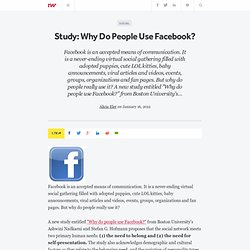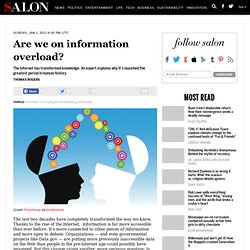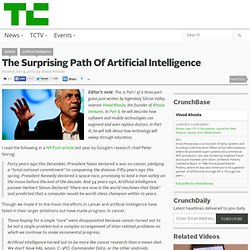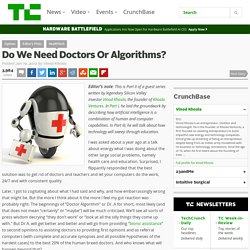

Facing up to threat of cyberwar. Thirty Years Before SOPA, MPAA Feared the VCR. Study: Why Do People Use Facebook? Facebook is an accepted means of communication.

It is a never-ending virtual social gathering filled with adopted puppies, cute LOL kitties, baby announcements, viral articles and videos, events, groups, organizations and fan pages. But why do people really use it? A new study entitled "Why do people use Facebook? " The future of the internet: A virtual counter-revolution. Are we on information overload? The last two decades have completely transformed the way we know.

Thanks to the rise of the Internet, information is far more accessible than ever before. It’s more connected to other pieces of information and more open to debate. Organizations — and even governmental projects like Data.gov — are putting more previously inaccessible data on the Web than people in the pre-Internet age could possibly have imagined. But this change raises another, more ominous question: Is this deluge overwhelming our brains? In his new book, “Too Big to Know,” David Weinberger, a senior researcher at Harvard’s Berkman Center for Internet and Society, attempts to answer that question by looking at the ways our newly interconnected society is transforming the media, science and our everyday lives.
Salon spoke to Weinberger over the phone about the rise of the information cloud, the demise of expert knowledge, and why this is the greatest time in human history. Yes. Yes, exactly. OK. It’s both good and bad. Fotoshop by Adobé. Google's 3D Human Body Browser Is Now Open-Source. Intel tries to help Stephen Hawking keep talking - latimes.com. Intel Corp. is trying to help physicist Stephen Hawking keep speaking.

Intel chief technology officer Justin Rattner told the Associated Press that the tech giant has a research team in Britain that is trying to come up with a new speech system for Hawking, who is severely diasabled by Lou Gehrig's disease. The goal is to keep Hawking's speech from continuing to slow. It's a tedious process for Hawking to speak. A tiny infrared sensor translates movement in his right cheek into words spoken by a voice synthesizer.
And now Hawking is losing the use of the nerves in that cheek. Rattner was to introduce Hawking on Sunday at the 70th birthday celebration for the renowned theoretical astrophysicist, but Hawking was too ill to attend. Hawking, author of the bestseller "A Brief History of Time" in 1988, has been honored for his breakthroughs in theories about time and relativity. Intel has a long history with Hawking. Book review: 'Stephen Hawking: An Unfettered Mind' -- Pat Benson. The Surprising Path Of Artificial Intelligence. Editor’s note: This is Part I of a three-part guest post written by legendary Silicon Valley investor Vinod Khosla, the founder of Khosla Ventures.

In Part II, he will describe how software and mobile technologies can augment and even replace doctors. In Part III, he will talk about how technology will sweep through education. Forty years ago this December, President Nixon declared a war on cancer, pledging a “total national commitment” to conquering the disease. Fifty years ago this spring, President Kennedy declared a space race, promising to land a man safely on the moon before the end of the decade.
And 54 years ago, Artificial Intelligence pioneer Herbert Simon declared “there are now in the world machines that think” and predicted that a computer would be world chess champion within 10 years. Though we made it to the moon the efforts in cancer and artificial intelligence have failed in their larger ambitions but have made progress. Do We Need Doctors Or Algorithms? Editor’s note: This is Part II of a guest series written by legendary Silicon Valley investor Vinod Khosla, the founder of Khosla Ventures.

In Part I, he laid the groundwork by describing how artificial intelligence is a combination of human and computer capabilities. In Part III, he will talk about how technology will sweep through education. I was asked about a year ago at a talk about energy what I was doing about the other large social problems, namely health care and education.